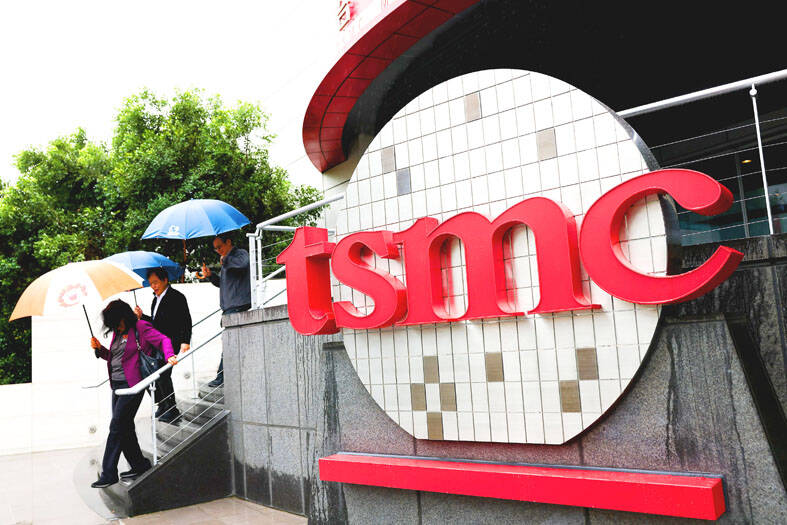Prosecutors yesterday charged three people with stealing trade secrets relating to Taiwan Semiconductor Manufacturing Co’s (TMSC, 台積電) most advanced 2-nanometer chips to help a Japanese company that makes equipment for the chipmaking giant.
TSMC is the world’s largest contract maker of chips that are used in everything from smartphones to missiles, and counts Nvidia Corp and Apple Inc among its clients.
The three people — including a former TSMC engineer who went to work for Tokyo Electron’s Taiwan subsidiary and two staff employed by the chipmaker at the time — were charged under the National Security Act (國家安全法) and the Trade Secrets Act (營業秘密法).

Photo: I-Hwa Cheng, AFP
“This case involves critical national core technologies vital to Taiwan’s industrial lifeline, gravely threatening the international competitiveness of Taiwan’s semiconductor sector,” the High Prosecutors’ Office’s Intellectual Property Branch said in a statement.
The ex-TSMC employee surnamed Chen (陳) allegedly used his relationships with former colleagues at the chipmaker to access trade secrets with the aim of helping Tokyo Electron “compete to become a supplier of equipment for more sites in TSMC’s advanced processes,” prosecutors said.
“After obtaining these files, Chen reproduced them to help Tokyo Electron improve etching machine performance and secure a qualification to supply production machinery for TSMC’s 2-nanometer etching process,” they said.
Tokyo Electron is a major producer of chipmaking equipment used by TSMC, winning the 2024 TSMC Excellent Performance Award for both “technology collaboration and production support.”
Prosecutors said they would seek prison sentences of 14 years for Chen, and nine and seven years for the other two defendants.
Another three people initially arrested in relation to the incident were not charged.
Tokyo Electron previously said it had sacked its staff member after they were “confirmed to be involved in an incident announced by Taiwanese judicial authorities on August 5.”
TSMC did not immediately reply to a request for comment.
The company said in a previous statement it had taken “strict disciplinary actions against the personnel involved” in the “potential trade secret leaks.”
TSMC did not provide details about the technology involved in the suspected leaks.

A magnitude 5.6 earthquake struck off the coast of Yilan County at 12:37pm today, with clear shaking felt across much of northern Taiwan. There were no immediate reports of damage. The epicenter of the quake was 16.9km east-southeast of Yilan County Hall offshore at a depth of 66.8km, Central Weather Administration (CWA) data showed. The maximum intensity registered at a 4 in Yilan County’s Nanao Township (南澳) on Taiwan’s seven-tier scale. Other parts of Yilan, as well as certain areas of Hualien County, Taipei, New Taipei City, Taoyuan, Hsinchu County, Taichung and Miaoli County, recorded intensities of 3. Residents of Yilan County and Taipei received

Taiwan has secured another breakthrough in fruit exports, with jujubes, dragon fruit and lychees approved for shipment to the EU, the Ministry of Agriculture said yesterday. The Animal and Plant Health Inspection Agency on Thursday received formal notification of the approval from the EU, the ministry said, adding that the decision was expected to expand Taiwanese fruit producers’ access to high-end European markets. Taiwan exported 126 tonnes of lychees last year, valued at US$1.48 million, with Japan accounting for 102 tonnes. Other export destinations included New Zealand, Hong Kong, the US and Australia, ministry data showed. Jujube exports totaled 103 tonnes, valued at

BIG SPENDERS: Foreign investors bought the most Taiwan equities since 2005, signaling confidence that an AI boom would continue to benefit chipmakers Taiwan Semiconductor Manufacturing Co’s (TSMC, 台積電) market capitalization swelled to US$2 trillion for the first time following a 4.25 percent rally in its American depositary receipts (ADR) overnight, putting the world’s biggest contract chipmaker sixth on the list of the world’s biggest companies by market capitalization, just behind Amazon.com Inc. The site CompaniesMarketcap.com ranked TSMC ahead of Saudi Aramco and Meta Platforms Inc. The Taiwanese company’s ADRs on Tuesday surged to US$385.75 on the New York Stock Exchange, as strong demand for artificial intelligence (AI) applications led to chip supply constraints and boost revenue growth to record-breaking levels. Each TSMC ADR represents

TRUST: The KMT said it respected the US’ timing and considerations, and hoped it would continue to honor its commitments to helping Taiwan bolster its defenses and deterrence US President Donald Trump is delaying a multibillion-dollar arms sale to Taiwan to ensure his visit to Beijing is successful, a New York Times report said. The weapons sales package has stalled in the US Department of State, the report said, citing US officials it did not identify. The White House has told agencies not to push forward ahead of Trump’s meeting with Chinese President Xi Jinping (習近平), it said. The two last month held a phone call to discuss trade and geopolitical flashpoints ahead of the summit. Xi raised the Taiwan issue and urged the US to handle arms sales to